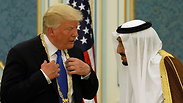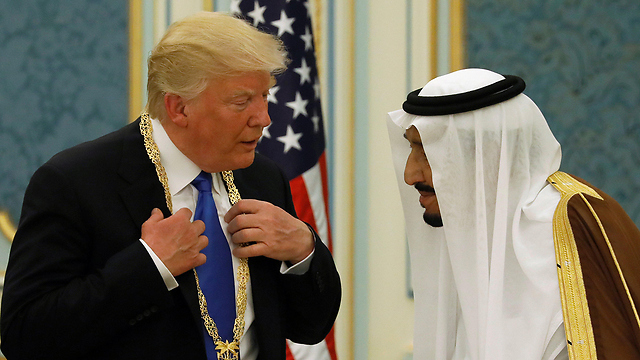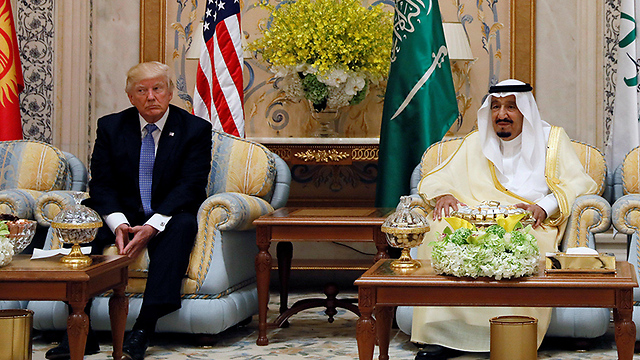
US President Donald Trump said Saturday that he had received assurances from King Salman of Saudi Arabia that the kingdom will increase oil production, "maybe up to 2,000,000 barrels" in response to turmoil in Iran and Venezuela.
Saudi Arabia acknowledged the call took place, but mentioned no production targets.
Trump wrote on Twitter that he had asked the king in a phone call to increase oil production "to make up the difference...Prices to (sic) high! He has agreed!"
Trump's tweet offered no timeframe for the additional 2 million barrels -- whether that meant per day or per month.
A little over an hour later, the state-run Saudi Press Agency acknowledged the call, but offered few details.
"During the call, the two leaders stressed the need to make efforts to maintain the stability of oil markets and the growth of the global economy," the statement said.
It added that there also was an understanding that oil-producing countries would need "to compensate for any potential shortage of supplies."
The statement did not mention any intention by Saudi Arabia, the world's top oil exporter, to raise production to 2 million barrels per day. Saudi oil officials did not immediately comment.
Just spoke to King Salman of Saudi Arabia and explained to him that, because of the turmoil & disfunction in Iran and Venezuela, I am asking that Saudi Arabia increase oil production, maybe up to 2,000,000 barrels, to make up the difference...Prices to high! He has agreed!
— Donald J. Trump (@realDonaldTrump) June 30, 2018
Saudi Arabia has a maximum sustainable capacity of 12 million bpd, but the world's top oil exporter and Organization of Petroleum Exporting Country's biggest producer has never tested that high level of production.
Last week, OPEC led by Saudi Arabia and its allies including Russia agreed to boost oil supplies after curbing output since 2017 to address a global supply glut.
Benchmark Brent crude was around $79 a barrel on Friday and a Reuters poll showed prices look to remain strong for the rest of this year due to supply disruptions in countries including Libya and Venezuela and the extra oil from OPEC fails to meet rising demand.
Riyadh plans to boost output to 11 million bpd, the highest in its history, in July up from 10.8 mln bpd in June, a source familiar with Saudi output plans told Reuters this week.
However, summer months in the US usually lead to increased demand for oil, pushing up the price of gasoline in a midterm election year. A gallon of regular gasoline sold on average in the US for $2.85, up from $2.23 a gallon last year, according to AAA.
It was not immediately clear at what level of production Trump was referring to or by when.
"We will be in uncharted territory. While Saudi Arabia has the capacity in theory, it takes time and money to bring these barrels online, up to one year," said Amrita Sen of consultancy Energy Aspects.
Saudi Energy Minister Khalid al-Falih met with US Secretary of State Mike Pompeo in Washington on Thursday to discuss energy security.
Oil prices have edged higher as the Trump administration has pushed US allies to end all purchases of oil from Iran. Oil prices also have risen with the ongoing unrest in Venezuela, as well as with fighting in Libya over control of that country's oil infrastructure.
Trump's comments came Saturday as global financial markets were closed. Brent crude stood at $79.42 a barrel.
The Trump administration has been counting on Saudi Arabia and other OPEC members to supply enough oil to offset the lost Iranian exports and prevent oil prices from rising sharply.
The administration has threatened close allies such as South Korea with sanctions if they don't cut off Iranian imports by early November. South Korea accounted for 14 percent of Iran's oil exports last year, according to the US Energy Department.
China is the largest importer of Iranian oil with 24 percent, followed by India with 18 percent. Turkey stood at 9 percent and Italy at 7 percent.
The State Department has said it expects the "vast majority" of countries will comply with the US request.
Trump announced in May that he would pull the United States out of a 2015 agreement over Iran's nuclear program, and would re-impose sanctions on Tehran. Previously, the administration said only that other countries should make a "significant reduction" in imports of Iranian crude to avoid US sanctions.
US officials are pressing allies in Europe, Asia and the Middle East to adhere to the sanctions, which are aimed at pressuring Iran to negotiate a follow-up agreement to halt its nuclear programs.
State Department officials said this week the United States is prepared to work with countries on a case-by-case basis to help them reduce imports of Iranian oil and suggested some exemptions were possible.
Iran's Supreme Leader Ayatollah Ali Khamenei on Saturday accused Washington of trying to turn Iranians against their government.
"They bring to bear economic pressure to separate the nation from the system ... but six US presidents before him tried this and had to give up," Khamenei was quoted as saying on Saturday by his website Khamenei.ir, referring to Trump.
Iran's OPEC governor, Hossein Kazempour Ardebili, accused the United States and Saudi Arabia of trying to push up oil prices and said both countries are acting against the foundation of OPEC.
"If this happens, (it) means Trump is asking Saudi Arabia to walk (away) from OPEC," he told Reuters.
"The market will go up to $100 I am sure as Saudi Arabia said they will plan an increase for July ... This was managed between the two to rob the pocket of rest of the world."
Kuwait planned to raise oil output by 85,000 barrels per day starting on Sunday, part of an agreement between OPEC and non-OPEC producers to increase production by one million bpd, its Energy Minister Bakhit al-Rashidi said on Saturday.
"Kuwait will raise its oil production from tomorrow to 2.785 million barrels, a daily increase of 85,000 compared to May, based on last week's production cut agreement," Rashidi told Arabic-language daily Al-Rai.


















